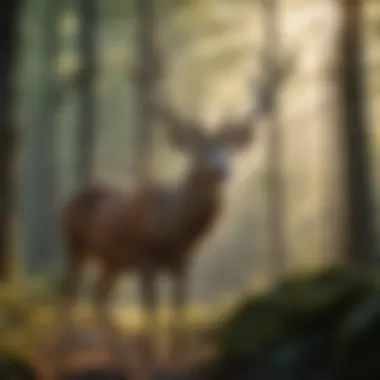Unveiling the Richness of Virginia's Public Hunting Landscape


Evergreen Trees Species
- Types of Evergreen Trees: Evergreen trees play a vital role in the intricate tapestry of American forests. Species such as Douglas Fir, Eastern Red Cedar, and Virginia Pine are prevalent in the diverse landscapes of Virginia, providing habitat and sustenance to various fauna species.
- Ecological Significance: Delving into the ecological importance of evergreen trees reveals their role in biodiversity maintenance, soil erosion prevention, and wildlife shelter. Their ability to retain green foliage throughout the year enhances carbon sequestration and oxygen production within forest ecosystems.
- Conservation Practices: Conservation efforts to safeguard evergreen tree species involve sustainable forestry methods, habitat restoration projects, and the integration of agroforestry practices to ensure the longevity of these invaluable ecological assets.
Introduction to Virginia's Hunting Scene
Virginia's hunting heritage runs deep, intertwined with the state's cultural and historical tapestry. Understanding the nuances of hunting in this region provides a profound insight into the evolution of societal norms and environmental practices. As we delve into the rich history and contemporary landscape of public hunting in Virginia, a confluence of tradition and conservation emerges, shaping both regulations and recreational pursuits. The importance of this topic lies in recognizing the integral role hunting plays in Virginia's identity, from colonial-era practices to modern-day wildlife management strategies.
Historical Significance of Hunting in Virginia
Colonial-era hunting practices
Delving into Virginia's colonial past unveils a fascinating narrative of hunting as a way of life. Colonial-era hunting practices were not merely recreational; they were essential for sustenance and survival. The sustainable harvest of wildlife provided colonists with food, fur, and revenue, shaping early economies. Despite the utilitarian nature of hunting, it also held symbolic significance, reflecting man's dominion over nature's resources. The legacy of colonial-era hunting practices endures in contemporary hunting traditions, emphasizing conservation and responsible stewardship.
Evolution of hunting regulations
The evolution of hunting regulations in Virginia mirrors a progressive shift towards sustainable wildlife management. Historically, regulations focused on game protection to ensure survival and prevent over-harvesting. Over time, legislation has become more intricate, encompassing wildlife habitat preservation, species conservation, and hunter safety. The modern regulatory framework balances the preservation of biodiversity with ensuring equitable access to hunting opportunities. This evolution highlights Virginia's commitment to ecological stewardship and fostering a harmonious relationship between humans and wildlife.
Current Landscape of Public Hunting
State-managed hunting areas
State-managed hunting areas represent a cornerstone of public hunting accessibility in Virginia. These designated regions aim to sustainably manage wildlife populations, offer recreational hunting opportunities, and conserve habitats. Through state initiatives, hunters can engage in ethically regulated hunting practices, contributing to wildlife population control and ecosystem health. State-managed areas serve as hubs for outdoor enthusiasts, fostering community engagement, environmental education, and conservation efforts.
Private lands open to public hunting
The inclusion of private lands open to public hunting expands the scope of accessible hunting grounds in Virginia, promoting a collaborative approach to wildlife conservation. Landowners who open their properties for public hunting not only support sustainable land use but also facilitate the exploration of diverse landscapes. This mutualistic arrangement benefits both landowners, who can manage wildlife populations effectively, and hunters, who gain access to premium hunting locations. By encouraging private-public partnerships, Virginia enhances the inclusivity and diversity of its hunting opportunities, paving the way for a holistic approach to wildlife management.
Licensing and Regulations
In the expansive realm of public hunting in Virginia, the pivotal aspect of licensing and regulations emerges as a cornerstone that sets the framework for hunters' activities. Licensing not only ensures compliance with state laws but also serves as a mechanism to regulate and monitor the hunting landscape. Adherence to regulations guarantees the sustainable utilization of wildlife resources while prioritizing safety and ethical practices. Understanding the nuances of licensing and regulations is imperative for both seasoned hunters and newcomers to navigate the intricacies of public hunting in Virginia.
Obtaining Hunting Licenses


Resident vs. Non-resident Licenses
The distinction between resident and non-resident hunting licenses is a crucial component of the hunting framework in Virginia. Resident licenses are tailored for individuals domiciled within the state, while non-resident licenses cater to those living outside its borders. This demarcation aims to ensure equitable access to hunting opportunities while preserving the state's wildlife resources. Residents benefit from reduced fees and priority access, fostering a sense of ownership and responsibility towards the local hunting ecosystem. In contrast, non-resident licenses enable visiting hunters to partake in Virginia's hunting experience, contributing to the state's tourism revenue. Understanding the differences between resident and non-resident licenses enables hunters to make informed decisions aligning with their hunting objectives and preferences.
Youth Hunting Licenses
Youth hunting licenses play a vital role in cultivating the next generation of conservationists and outdoor enthusiasts. Designed to encourage youth participation in hunting activities, these licenses provide a platform for experiential learning and skill development. By offering reduced fees and specialized guidelines, youth hunting licenses aim to bridge the generational gap in hunting demographics, fostering a sustainable hunting legacy. Engaging young individuals through tailored licensing mechanisms not only instills a sense of responsibility towards wildlife conservation but also nurtures a deep-rooted appreciation for nature's wonders.
Regulations and Seasonal Guidelines
Hunting Seasons for Different Game
The delineation of hunting seasons for various game species regulates the timing and duration of hunting activities in Virginia. This structured approach aligns hunting practices with wildlife breeding and migration patterns, ensuring species conservation and ecological balance. By designating specific seasons for each game species, hunters are incentivized to adhere to sustainable harvesting practices, mitigating the risk of overexploitation. Hunting seasons also contribute to recreational opportunities, allowing hunters to immerse themselves in diverse hunting experiences throughout the year.
Bag Limits and Tagging Requirements
Bag limits and tagging requirements form the cornerstone of responsible hunting practices in Virginia. By imposing restrictions on the number and type of game that hunters can harvest, bag limits prevent indiscriminate hunting and promote wildlife population management. Tagging requirements further enhance traceability and accountability in hunting activities, ensuring compliance with regulations and ethical standards. Adhering to bag limits and tagging requirements not only safeguards wildlife populations but also fosters a culture of conservation and sustainable hunting practices.
Safety Measures and Etiquette
Hunter Education Requirements
Hunter education requirements stand as a fundamental pillar in promoting safety, ethics, and proficiency among hunters in Virginia. Completion of hunter education courses equips hunters with essential knowledge on firearms safety, wildlife conservation, and hunting ethics. By prioritizing education and training, Virginia cultivates a community of responsible and skilled hunters who prioritize safety and environmental stewardship. Compliance with hunter education requirements is not only a legal obligation but a testament to hunters' commitment towards sustainable hunting practices.
Ethical Hunting Practices
Ethical hunting practices encompass a set of moral codes and behavioral norms that guide hunters' conduct in the field. Emphasizing principles of fair chase, respect for wildlife, and humane harvesting, ethical hunting practices underscore hunters' role as stewards of the land. Upholding ethical standards not only enhances the hunting experience but also fosters a culture of reverence towards nature. By embracing ethical hunting practices, hunters in Virginia demonstrate a profound respect for wildlife and the interconnectedness of ecosystems, embodying the essence of responsible conservation and outdoor recreation.
Wildlife Diversity in Virginia
In this section, we will delve into the rich wildlife diversity present in Virginia, a topic essential for any discussion on public hunting in the state. Understanding the array of native species available for hunting is crucial for hunters and conservationists alike. Virginia boasts a diverse range of wildlife, making it a prime destination for hunting enthusiasts and nature lovers. The intricate balance of ecosystems and habitats in Virginia contributes to the flourishing populations of various game species, providing a unique hunting experience for enthusiasts. Exploring the wildlife diversity in Virginia allows us to appreciate the state's commitment to wildlife conservation and sustainable hunting practices.
Native Species for Hunting


Whitetail Deer
The Whitetail deer, known for its elusive nature and challenging hunt, holds significant importance in the hunting landscape of Virginia. Its graceful movements and keen senses make it a prized target for seasoned hunters. The adaptability of Whitetail deer to various terrains and habitats makes them a popular choice for hunters seeking a challenging pursuit. However, their wariness and acute survival instincts pose a challenge to even the most skilled hunters. Understanding the behavior and habits of Whitetail deer is essential for a successful hunt in Virginia's wilderness.
Wild Turkey
Wild turkeys, with their distinctive gobble, play a vital role in Virginia's hunting diversity. Their prevalence in wooded areas and open fields makes them a sought-after game species. The unique calls and mating displays of wild turkeys add to the excitement of hunting these majestic birds. While their keen eyesight and cautious nature present challenges to hunters, the thrill of a successful turkey hunt is unparalleled. Navigating the habitats favored by wild turkeys requires patience, strategy, and a deep appreciation for the natural world.
Black Bear
The presence of Black bears in Virginia's wild spaces symbolizes the state's thriving biodiversity. These powerful yet elusive creatures offer a thrilling hunting experience for those seeking adventure and challenge. Their large size and cunning nature make hunting Black bears a test of skill and patience. Understanding the behavior patterns and territories of Black bears is essential for a safe and successful hunt. Engaging in bear hunting in Virginia requires adherence to strict regulations and ethical guidelines to ensure the conservation of this iconic species.'
Habitat Varieties for Hunting
Mountainous Terrains
Virginia's mountainous terrains provide a diverse and challenging hunting environment for outdoor enthusiasts. The rugged landscapes and varied elevations offer a unique hunting experience unparalleled in other regions of the state. Hunting in mountainous terrains requires adaptability and physical endurance due to the demanding nature of the terrain. Navigating through dense forests and rocky terrains adds an element of adventure to the hunting expedition in Virginia's mountains.
Coastal Wetlands
The coastal wetlands of Virginia present a different hunting experience, characterized by vast marshes and diverse bird populations. Hunting in these coastal habitats requires a keen understanding of waterfowl behavior and migratory patterns. The tranquil beauty of the wetlands serves as a backdrop for thrilling waterfowl hunts, making it a popular choice for seasoned hunters. Exploring the coastal wetlands of Virginia offers a chance to connect with nature and appreciate the delicate balance of life in these unique ecosystems.
Mixed Hardwood Forests
Virginia's mixed hardwood forests provide an excellent hunting ground for a variety of game species. The diverse flora and fauna within these forests create a rich tapestry of hunting opportunities for enthusiasts. Navigating through dense undergrowth and towering trees requires stealth and patience, adding to the allure of hunting in mixed hardwood forests. The changing seasons bring forth different challenges and rewards for hunters, making each expedition a memorable and fulfilling experience in Virginia's vibrant woodland habitats.
Popular Hunting Destinations in Virginia
Virginia boasts a diverse array of popular hunting destinations that attract outdoor enthusiasts and wildlife aficionados alike. From the majestic Shenandoah National Park to the expansive George Washington National Forest and the serene Chickahominy Wildlife Management Area, each location offers unique experiences and opportunities for hunters to immerse themselves in the natural beauty of Virginia's landscapes.
Shenandoah National Park
Game Species Available


Shenandoah National Park is home to a varied range of game species, including white-tailed deer, wild turkey, and black bear. These species contribute to the rich biodiversity of the park, offering hunters a chance to engage in challenging and rewarding hunts. White-tailed deer, known for their elusive nature and impressive antlers, are a popular choice among hunters for their challenging pursuits. Wild turkey, with their distinct calls and agile movements, provide an exciting hunting experience. Black bears, known for their elusive behavior, offer a unique and thrilling opportunity for experienced hunters.
Hunting Access Points
Access points in Shenandoah National Park provide hunters with convenient entry into the park's extensive hunting grounds. These access points are strategically located to ensure hunters can navigate the park efficiently and safely. The accessibility of hunting areas ensures that hunters can explore diverse habitats and engage with different game species. Additionally, these access points allow for a seamless hunting experience, enhancing the overall enjoyment and success of hunting expeditions.
George Washington National Forest
Regulations and Permits
George Washington National Forest enforces strict regulations and permit requirements to ensure sustainable hunting practices and wildlife conservation. These regulations serve to protect native species and maintain ecological balance within the forest. By adhering to these regulations and obtaining permits, hunters contribute to the preservation of the forest's natural resources and support conservation efforts.
Wildlife Observation Opportunities
Apart from hunting, George Washington National Forest offers exceptional wildlife observation opportunities. The forest's diverse ecosystems provide a habitat for a wide range of wildlife species, allowing visitors to observe animals in their natural environments. From songbirds to white-tailed deer, the forest teems with life, providing nature enthusiasts with unique and educational experiences.
Chickahominy Wildlife Management Area
Waterfowl Hunting
The Chickahominy Wildlife Management Area is renowned for its exceptional waterfowl hunting opportunities. Waterfowl, including ducks and geese, frequent the wetlands of the area, providing hunters with challenging and rewarding hunting experiences. The habitat of the Chickahominy Wildlife Management Area supports a thriving waterfowl population, attracting hunters who seek to engage in waterfowl hunting in a pristine natural setting.
Habitat Conservation Efforts
The Chickahominy Wildlife Management Area actively engages in habitat conservation efforts to maintain the ecological balance of its surroundings. These conservation initiatives aim to protect the habitats of various wildlife species, ensuring their sustainability and well-being. By promoting habitat conservation, the area preserves its natural beauty and supports the continued presence of diverse wildlife populations.
Conclusion
Public hunting in Virginia is not merely a recreational activity; it is a vital link to the state's rich heritage and conservation efforts. As we conclude our exploration of public hunting in Virginia, it is essential to recognize the multifaceted importance of this topic. Embracing the hunting heritage involves more than just tradition; it is a means of preserving ecosystems, maintaining biodiversity, and passing down age-old skills and knowledge to future generations. By balancing conservation and recreation, hunters play a crucial role in sustainable land management and wildlife population control, ensuring a harmonious coexistence of humans and nature.
Embracing the Hunting Heritage
Preservation of hunting traditions
Preservation of hunting traditions signifies honoring customs and practices that have been integral to Virginia's history. This aspect contributes significantly to our understanding of the state's cultural heritage and ecological balance. One key characteristic of preservation is its ability to promote sustainable hunting practices that respect wildlife populations and their habitats. By upholding hunting traditions, we not only safeguard biodiversity but also promote ethical and responsible behavior among hunters. The unique feature of preservation lies in its ability to foster a sense of connection to the land and its wildlife, creating a profound appreciation for the natural world. While there may be challenges in balancing tradition with modern conservation needs, the advantages of preserving hunting customs in Virginia far outweigh the drawbacks, as it ensures the continuity of time-honored practices vital for ecological well-being.
Balancing conservation and recreation
Balancing conservation and recreation is crucial for maintaining the delicate equilibrium between human activities and environmental sustainability. This aspect plays a pivotal role in ensuring that hunting remains a viable and ethical pursuit in Virginia. The key characteristic of this balance is its emphasis on sustainable practices that support wildlife conservation while allowing for recreational hunting opportunities. By integrating conservation efforts with recreational activities, hunters contribute to habitat protection, species preservation, and overall ecosystem health. The unique feature of this balance is its promotion of a shared responsibility among hunters to actively participate in conservation initiatives while enjoying the recreational aspects of their sport. While challenges may arise in finding the perfect equilibrium between conservation and recreation, the benefits of a harmonious coexistence between these two aspects are undeniable, paving the way for a more sustainable and ethical approach to hunting in Virginia.



